Wray Castle Hub - LTE
-
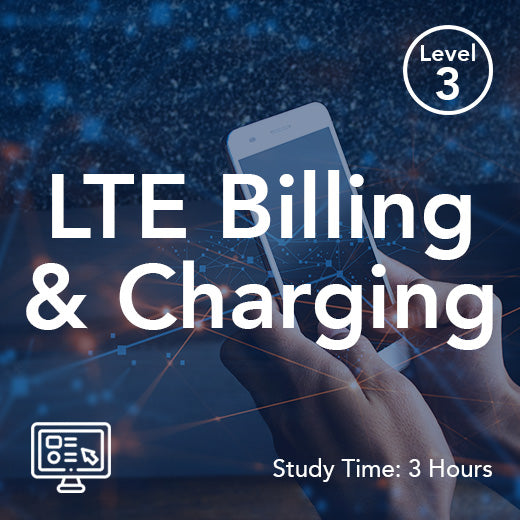
LTE Billing and Charging (On-Demand)
Our LTE Billing and Charging Training Course provides a comprehensive technical overview of the billing and charging architecture specifically designed for 4G LTE networks. Participants will gain insights into LTE bearer, traffic flow, and Quality of Service (QoS) concepts, as well as an in-depth understanding of the architecture of both online and offline billing systems. Key nodes, interfaces, and protocols used for transporting billing and charging information will be explored, along with the interactions with the billing system during basic LTE procedures. This course is ideal for engineers, designers, managers, and individuals involved in the development, deployment, or operation of LTE billing and charging systems. Familiarity with the LTE Evolved Packet Core is assumed, and experience with 2G or 3G billing systems would be beneficial. Topics covered include EPS bearer concepts, LTE QoS models, packet flows, deep packet inspection, policy and charging control, flow-based charging, billing architecture, charging data capture points, protocols (Diameter, CAP), interfaces (Gy, Gz, Rf, Ro), charging criteria, CDR formats, CDR generation, and charging interaction with basic LTE procedures. Join us for this informative and practical training session to enhance your knowledge and skills in LTE billing and charging. This self-paced on-demand distance learning course features illustrated course books, videos, tests and full tutor support. Who would benefit Engineers, designers, managers and others involved in the development, deployment or operation of LTE billing and charging systems. Prerequisites Familiarity with the LTE Evolved Packet Core is assumed. Experience of 2G or 3G billing systems would be beneficial. Topic Areas Include Review of EPS bearer concepts and LTE QoS models Packet flows, service data flows and traffic flow aggregates Deep packet inspection – heuristic algorithms and bearer-aware applications Outline of policy and charging control LTE billing and charging concepts Flow-based charging Billing architecture Online and offline charging systems Charging data capture points (S-GW, PDN-GW) IMS charging capture points Charging Data Function (CDF) Protocols – Diameter, CAP Interfaces – Gy, Gz, Rf, Ro and others Charging criteria – time-based, volume-based, application-based CDR formats CDR generation Charging interaction with basic LTE procedures
£95.00
-
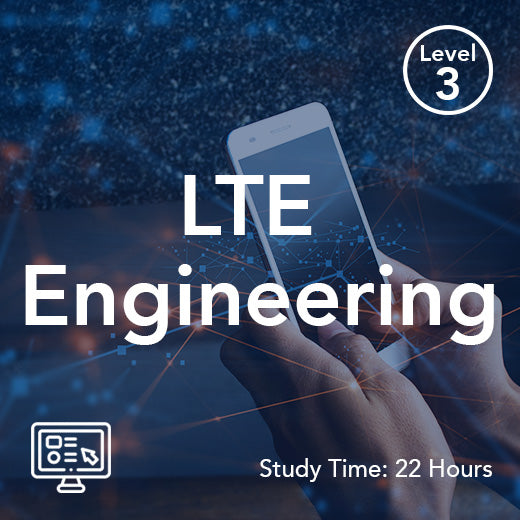
LTE Engineering (On-Demand)
A technical introduction and overview of LTE and LTE-Advanced, including the air interface, radio access network, core network and other key associated technologies. This self-paced on-demand distance learning course features illustrated course books, videos, tests and full tutor support. Who would benefit This course is intended for engineers either new to, or already working in, mobile communications. Prerequisites Familiarity with telecommunications and general engineering terminology is assumed and some understanding of 2G and 3G cellular systems would be beneficial. Topic Areas Include High level architecture of LTE Basic principles of OFDMA and SC-FDMA Air interface protocol stack Structure of the air interface physical layer E-UTRAN architecture, interfaces and protocols EPC architecture, interfaces and protocols LTE state diagrams Principles of bearers and Quality of Service (QoS) Voice options for LTE Power-on procedures UE procedures in idle and connected modes Enhancements in LTE-Advanced
£750.00
-
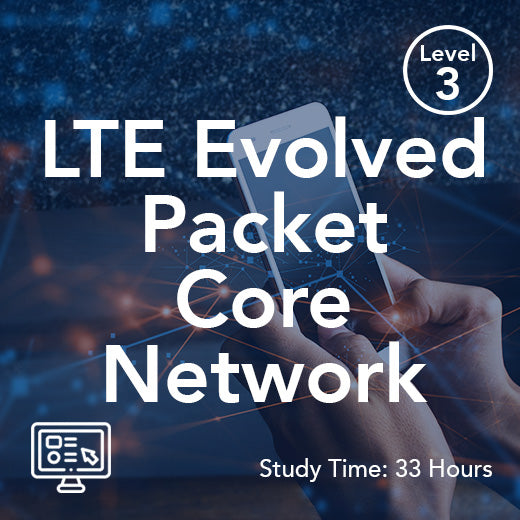
LTE Evolved Packet Core Network (On-Demand)
Our LTE Evolved Packet Core Network Training Course is designed to provide a comprehensive technical understanding of the Evolved Packet Core (EPC) for LTE systems. In this course, participants will learn about EPC architecture, interfaces, service provision concepts, application of IP technologies, overall protocol architectures, and optionally, a review of IMS functionality Engineers and other staff involved with switching or transmission architecture, optimization, network management, network testing, or monitoring of the EPC would greatly benefit from this training. Participants are expected to have an engineering background with some knowledge of core network technologies, including IP. Experience with 2G or 3G systems would also be beneficial for a better understanding of the course material. The course covers a wide range of topic areas, including the high-level architecture of LTE, functions of key EPC components like MME, S-GW, PDN-GW, HSS, and PCRF, LTE state diagrams, inter-operation with 2G, 3G, and non-3GPP networks, voice options for LTE, principles of bearers and Quality of Service (QoS), data transport in the EPC, policy and charging control architecture, IETF and 3GPP protocols in the EPC, power-on procedures, UE procedures in idle and connected modes, enhancements in LTE-Advanced, and optionally, an overview of the functions and architecture of the IMS. This self-paced on-demand distance learning course features illustrated course books, videos, tests and full tutor support. Who would benefit Engineers and other staff involved with switching or transmission architecture, optimization, network management, network testing or monitoring of the EPC. Prerequisites An engineering background with some knowledge of core network technologies, including IP, is assumed. Experience of 2G or 3G systems would be beneficial. Topic Areas Include High level architecture of LTE Functions of the MME, S-GW, PDN-GW, HSS and PCRF LTE state diagrams Inter-operation with 2G, 3G and non-3GPP networks Voice options for LTE Principles of bearers and Quality of Service (QoS) Data transport in the EPC Policy and charging control architecture IETF protocols in the EPC, including SCTP, DiffServ and Diameter 3GPP protocols in the EPC, including GTP and S1-AP Power-on procedures UE procedures in idle and connected modes Enhancements in LTE-Advance
£950.00
-
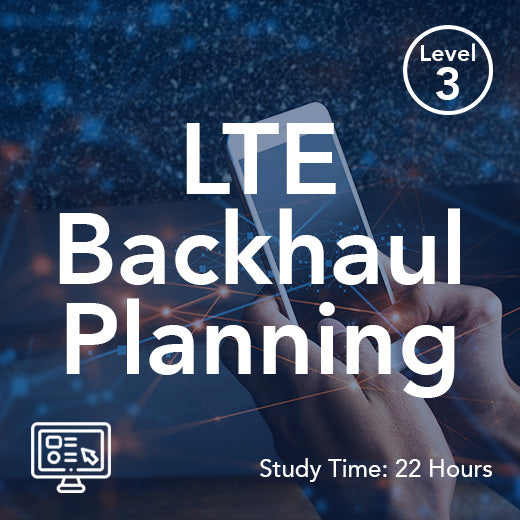
LTE Backhaul Planning (On-Demand)
This course provides a detailed overview of the issues related to the planning of backhaul services designed to support 4G LTE Cellular sites in both dedicated and single Radio Access Network (RAN) environments. The course focuses on planning techniques related to the most commonly-employed backhaul technologies used in conjunction with LTE, such as Ethernet, packet-based microwave and IP. It also covers aspects such as timing and security solutions and presents techniques that can be employed to estimate backhaul requirements and plan for suitable deployments. Join our LTE Backhaul Planning Training Course to gain a comprehensive understanding of the planning techniques and technologies essential for supporting 4G LTE Cellular sites. This course is designed for engineers working for network operators involved in the planning and implementation of RANs, specifically focusing on the backhaul region from the cell tower back to the core network. You will learn about backhaul technologies such as Ethernet, packet-based microwave, and IP, as well as timing and security solutions crucial for LTE deployments. Our 1-day course covers topics including backhaul overview, defining 4G backhaul requirements, transport network evolution, synchronization options, VLAN management, and more. By the end of the training, you will be equipped with the knowledge and skills to estimate backhaul requirements, plan suitable deployments, and ensure efficient backhaul solutions for 4G LTE networks. No specific prerequisites are required for this course, making it accessible to a wide range of professionals in the telecom industry. Sign up now to enhance your expertise in LTE backhaul planning and stay ahead in the rapidly evolving telecommunications sector. This course is delivered as a self-paced on-demand distance learning course and features illustrated course books, videos, tests and full tutor support. Who would benefit This course is designed for engineers working for network operators in the planning and implementation of RANs and in particular the backhaul region from the cell tower back to the core network and are looking at the options that exist to provide backhaul solutions suitable for 4G LTE networks. Prerequisites No specific prerequisites for this course although a good understanding of mobile networks and in particular the radio access part of 3GPP based networks. Topic Areas Include Backhaul overview Backhaul planning techniques Defining 4G backhaul requirements Backhaul technologies appropriate for 4G networks Transport network evolution Multi RAT and Multi Operator (MRMO) Synchronization options Cell throughput expectations Industry initiatives and forums Radio to transport QoS mapping VLAN management Backhaul traffic profile Backhaul QoS Planning exercise – cell throughput calculations On-Demand Online Training Our self-paced on-demand distance learning programmes are accessible on any computer, tablet or smartphone and allow you to study at a time and location that is convenient to you. Each course includes: Illustrated Course Books - featuring leading edge knowledge from subject matter experts. Videos - Detailed videos expand the points covered in the course books, discussing topics in greater depth. Tutor Support – Dedicated course tutors are available to answer any questions you might have throughout your studies. Formative Assessment - Modules include regular quizzes to support learning by testing your knowledge of the subject matter. Certification– Successfully complete the end of module tests to earn Digital Badges to demonstrate the depth of your knowledge of the topic. Included in Wray Castle Hub This course is also available as part of the Wray Castle Hub. An annual subscription delivers unlimited access to this course and over 500 hours of learning material consisting of 30+ Courses, 190+ Learning Modules, and 1,000+ Videos. Annual Subscription: £1400 (Most cost-effective option) Subscribe to Wray Castle Hub here
£500.00
-
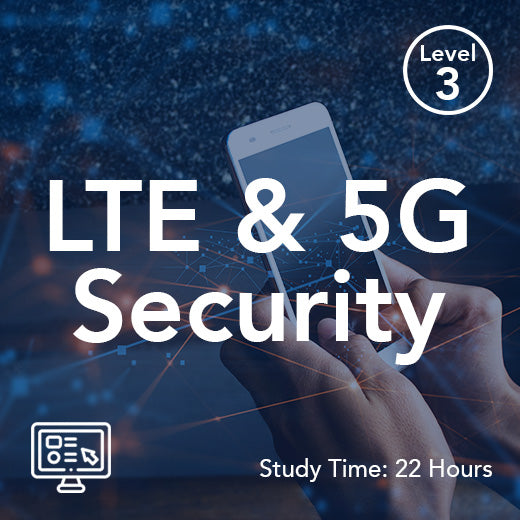
LTE and 5G Security (On-Demand)
LTE and 5G systems play a crucial role in our modern communication landscape, with the potential to revolutionize how we connect and interact with our devices. As these technologies become more prevalent, ensuring the security of our data and privacy becomes paramount. The LTE and 5G Security On-Demand Training Course offered by Wray Castle provides a comprehensive overview of the security measures implemented in LTE and 5G networks, covering key aspects such as authentication, key agreement, and network security protocols. This self-paced distance learning course delves into the intricacies of LTE and 5G security architectures, exploring the evolution from LTE to 5G and the security enhancements introduced in the latest generation of cellular networks. Participants will gain a deep understanding of the security procedures and key derivation methods used in both Non-standalone and Standalone Modes of 5G networks, as well as the authentication and interworking protocols involved in ensuring a secure communication environment. Designed for engineers, managers, and technical professionals working in the telecommunications industry, this course is also beneficial for individuals looking to broaden their knowledge of LTE and 5G security protocols. Whether you are new to the field or have prior experience in telecoms, this training course will equip you with the essential skills and insights needed to navigate the complex security challenges posed by LTE and 5G networks. This self-paced on-demand distance learning course features illustrated course books, videos, tests and full tutor support. Who would benefit This course is designed for engineers, managers and other personnel who have a need to acquire a technical overview of the security environment employed within LTE and 5G networks. It will also be of benefit to those in the wider technical community who have a need to understand the security protocols employed by cellular networks. Prerequisites Attendance on, or equivalent knowledge, LTE Engineering or 5G Engineering would be useful. Alternatively, experience working in this area of telecoms. Topic Areas Include LTE Security Architecture Authentication and Key Agreement Evolution to 5G 5G Non-Standalone Mode Security 5G Standalone Mode Security
£750.00
-

Machine Type Communications for LTE (On-Demand)
Mobile communication systems were originally designed to support voice (with SMS), but then focused primarily on developing data connectivity. With broadband connectivity representing the major areas of opportunity, networks were standardised, deployed and optimised to fully support that [fairly narrow] set of use cases. More recently, machine to machine communication, the Internet of Things (IoT) and connected innovation have seen massive growth, and become a much bigger part of the communications industry. However, the data connectivity requirements are very different to that of broadband. In order to optimally support this type of data, a number of modifications, new features, and complimentary technologies have been introduced to the networks. In LTE, these are grouped under the term Machine Type Communications (MTC). This course explores the technical aspects of MTC for LTE, and includes an examination of NB-IoT (Narrowband IoT) as a complimentary technology. Initially, the course provides an overview of IoT and low power networking / connectivity systems, and highlights the role and requirements of LTE for MTC. We then look at the features and performance of the different categories of MTC UE (User Equipment), the Air Interface modifications and features, and the Cellular IoT (C-IoT) enhancements to the Evolved Packet Core (EPC). Course Modules Introduction to LTE and the Internet of Things (IoT) LTE Technologies for the IoT NB-IoT and IoT Core Network Enhancements
£95.00
-
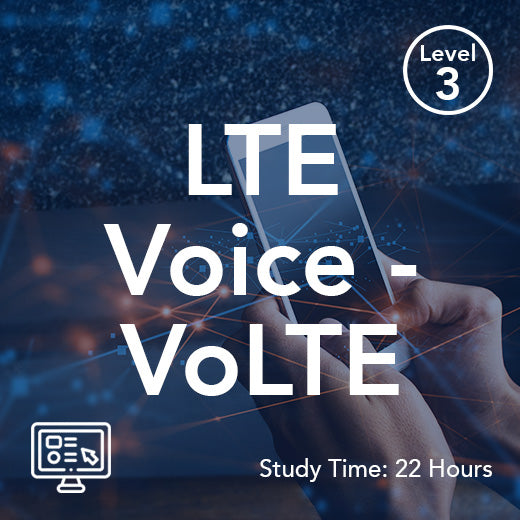
LTE Voice - VoLTE (On-Demand)
Our LTE Voice (VoLTE) training course is designed to provide a comprehensive technical understanding of how VoIP services are delivered using LTE and the IP Multimedia Subsystem. This course is ideal for engineering and technical management professionals looking to gain in-depth knowledge of the options available in LTE for delivering voice and real-time traffic through VoIP. Topics covered in this course include a technical overview of LTE, introduction to LTE voice options, IP Multimedia Subsystem (IMS) overview, Voice over LTE (VoLTE) system architecture, VoLTE protocols, services, and codecs, VoLTE call setup procedures, SRVCC, SMS delivery over IMS, VoLTE emergency calls, and Voice over Wi-Fi. This self-paced on-demand distance learning course features illustrated course books, videos, tests and full tutor support. Who would benefit This course is suitable for engineering and technical management staff who require a technical description of the options that exist in LTE for delivering voice and other real-time traffic types by means of VoIP. Prerequisites Attendance on this course assumes previous attendance on the LTE Engineering Overview course (LT3600) or equivalent basic LTE knowledge (although a recap of basic LTE architecture and concepts is provided at the start of the course) and also assumes a working knowledge of IP. Topic Areas Include Technical overview of LTE Introduction to the options for LTE voice Technical overview of the IP Multimedia Subsystem (IMS) System architecture for Voice over LTE (VoLTE) VoLTE protocols, services and codecs VoLTE power-on and registration procedures VoLTE call setup procedures Access domain selection Single Radio Voice Call Continuity (SRVCC) Delivery of SMS messages over the IMS VoLTE emergency calls Voice over Wi-Fi
£750.00
-
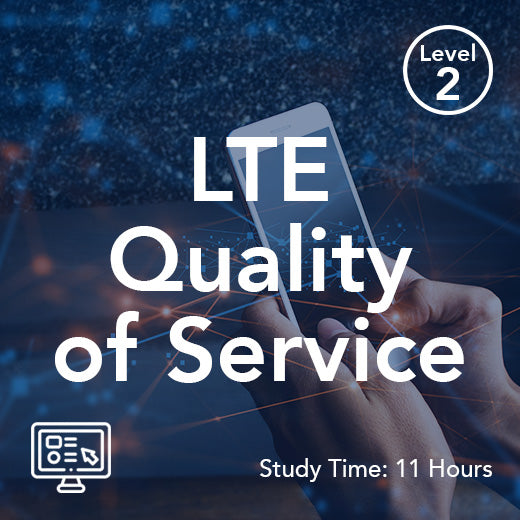
LTE Quality of Service (On-Demand)
Our LTE Quality of Service training course is designed to provide a comprehensive understanding of the key concepts and principles behind Quality of Service (QoS) in LTE networks. This course delves into the End-to-End EPS Bearer and the underlying Transport Network Layer (TNL) where QoS is crucially applied. Participants will explore the main QoS concepts and learn about the interworking between LTE QoS and other network types such as UMTS, GPRS, and IMS.This course is ideal for engineering and technical management professionals who need a technical overview of the technologies and techniques utilized by 4G LTE networks to define and control the QoS for user connections. Participants are expected to have an engineering background with some knowledge of telecommunications technologies and protocols. Previous LTE training and familiarity with QoS mechanisms in legacy 2G and 3G networks would be beneficial.By enrolling in this course, you will gain insights into topics such as E-UTRAN architecture and interfaces, EPS Bearer and PDN Connectivity options, LTE QoS parameters, QCI, ARP, QoS Management, LTE PCC mechanisms, TNL concepts, DiffServ, MPLS, Ethernet QoS, and much more. Enhance your knowledge and skills in LTE QoS with our expert-led training course. This self-paced on-demand distance learning course features illustrated course books, videos, tests and full tutor support. Who would benefit This course is suitable for engineering and technical management staff who require a technical overview of the technologies and techniques employed by 4G LTE networks to define and control the QoS applied to user connections. Prerequisites An engineering background with some knowledge of telecommunications technologies and protocols is assumed and previous LTE training would be beneficial, as would knowledge of QoS mechanisms in legacy 2G and 3G networks. Topic Areas Include E-UTRAN architecture and interfaces EPS Bearer and PDN Connectivity options and operations User plane connection concepts, packet flows, SDFs and Traffic Flow Aggregates LTE QoS parameters, QCI, ARP QoS parameter representation in LTE signalling protocols QoS Management – TFTs and packet filters LTE PCC (Policy and Charging Control) mechanisms PCC Rules, function and structure Interaction between PCC elements and internal and external network nodes Mapping LTE QoS to legacy network schemes Measuring QoS TNL concepts, architecture and QoS mechanisms DiffServ, MPLS and Ethernet QoS End-to-End QoS Architecture and Operation Network node QoS functions QoS influence on LTE handovers
£500.00
-
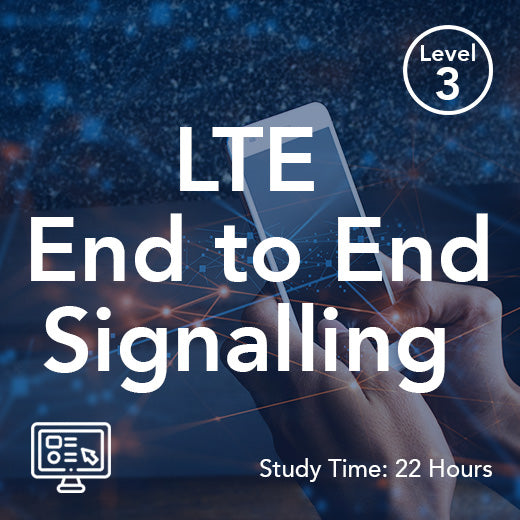
LTE End-to-End Signalling (On-Demand)
This course is designed to provide an end-to-end view of the whole set of signalling messages that support some of the most fundamental LTE network operations, such as: initial attach, PDN Connectivity, EPS Bearer setup, bearer resource allocation, handover and detach. Each procedure is presented in terms of the progression of signalling messages exchanged and each message is explored in detail. The course provides details of messages belonging to the following signalling protocols: RRC, NAS, S1AP, X2AP, GTPv2-C and also the Diameter S6a, S13 and Gx applications. Our LTE End-to-End Signalling Training Course (Course Code: LT1301) offers a comprehensive overview of the signalling messages involved in key LTE network operations. From initial attach to handover and detach procedures, participants will gain a deep understanding of the signalling protocols including RRC, NAS, S1AP, X2AP, GTPv2-C, and Diameter S6a, S13, and Gx applications. This course is ideal for engineers, managers, and personnel seeking a technical overview of the complete LTE signalling environment, providing valuable insights into the management of fundamental LTE procedures. Participants in this course will benefit from a detailed exploration of air interface signalling protocols, E-UTRAN signalling protocols, and EPC signalling protocols. Topics covered include initial attach procedures, idle mode procedures, connected mode procedures, handover procedures, and detach procedures. Prerequisites include a basic understanding of LTE network architecture, services, and protocols, which can be acquired through our LTE Engineering Overview and LTE Evolved Packet Core Network (LT3604) courses. An understanding of IP would also be beneficial for participants. Gain the knowledge and skills needed to navigate the complexities of LTE signalling protocols and procedure This self-paced on-demand distance learning course features illustrated course books, videos, tests and full tutor support. Who would benefit This course is designed for engineers, managers and other personnel who have a need to acquire a technical overview of the total LTE signalling environment (not just signalling in one part of the network) and also those that require an end-to-end view of the management of fundamental LTE procedures. Prerequisites A basic understanding of LTE network architecture, services and protocols, which can be gained from attending the LTE Engineering Overview (LT3600) and LTE Evolved Packet Core Network (LT3604) courses. An understanding of IP would be beneficial. Topic Areas Include Air interface signalling protocols E-UTRAN signalling protocols EPC signalling protocols Initial attach procedures Idle mode procedures S1 release Tracking area update procedure Service request procedure with ISR enabled Extended service request for CS fallback Connected mode procedures Connection establishment, modification and release Bearer resource allocation triggering dedicated EPS bearer establishment Bearer resource modification triggering EPS bearer modification PDN connectivity request Handover procedures X2-based handover with direct forwarding S1-based handover with S-GW change with indirect forwarding Inter-System PS handover to UMTS/HSPA without forwarding Detach procedures
£750.00
-
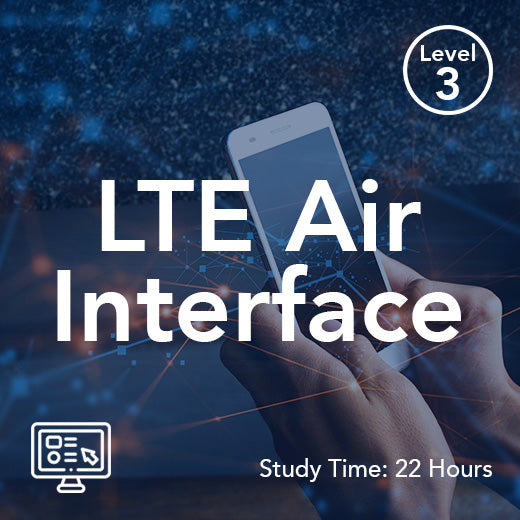
LTE Air Interface (On-Demand)
Our LTE Air Interface Training Course is designed to provide a comprehensive understanding of the air interface for LTE radio access. This course covers OFDMA principles, access and non-access stratum protocols, channel structures, connectivity and mobility management procedures, as well as radio link control functions. Engineers involved in equipment design, operation, optimization, or monitoring of the LTE radio link will benefit greatly from this training. Participants are expected to have an engineering background with some knowledge of digital radio systems and general radio principles and techniques. A basic understanding of LTE and experience with 2G or 3G systems would also be beneficial. Topics covered in the course include LTE system architecture, E-UTRAN architecture and interfaces, OFDMA/SC-FDMA basic principles, MIMO concepts and implementation, physical layer structures, access and non-access stratum protocols, and more. Enhance your knowledge and skills in LTE radio access and stay ahead in the rapidly evolving telecommunications industry. This self-paced on-demand distance learning course features illustrated course books, videos, tests and full tutor support. Who would benefit Engineers involved with equipment design, operation, optimization or monitoring of the LTE radio link. Prerequisites An engineering background with some knowledge of digital radio systems and general radio principles and techniques is assumed. A basic understanding of LTE and experience of 2G or 3G systems would be beneficial. Topic Areas Include LTE system architecture E-UTRAN architecture and interfaces OFDMA/SC-FDMA basic principles Defining orthogonality OFDMA features and benefits The Fourier transform OFDMA/SC-FDMA transmitter and receiver chains Modulation and coding, MIMO and the Cyclic Prefix MIMO concepts and implementation Physical layer structures Access and non-access stratum protocols Logical, Transport and Physical channels RRC, PDCP, MAC and RLC functions Resource allocation and scheduling strategies LTE-Advanced concepts Lower layer procedures Connection establishment Radio resource management procedures
£950.00























